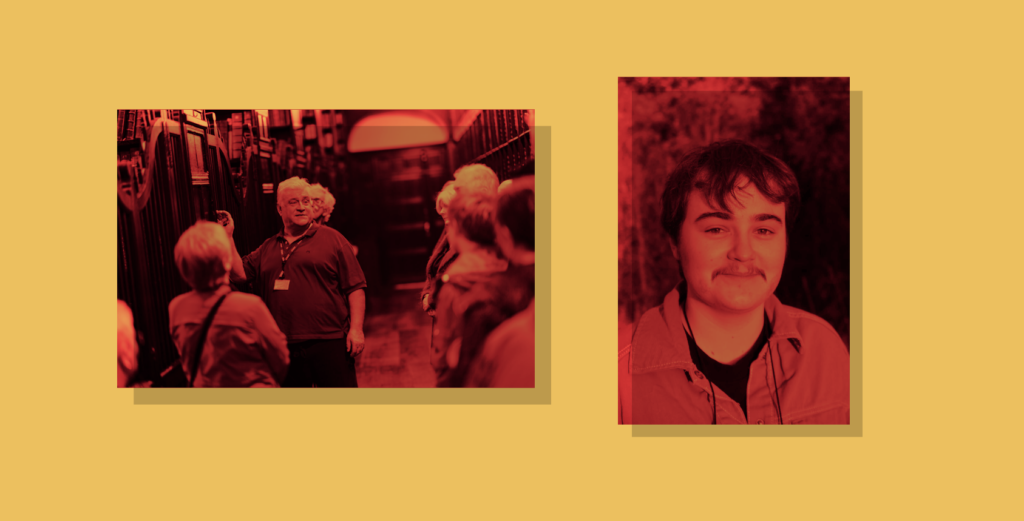Manchester, a UNESCO City of Literature, is home to 22 public libraries, with the oldest of these having existed since 1653. It’s also home to independents, such as The Portico and university libraries, including the Manchester Poetry Library, the North West’s first poetry library.
Who are the people working behind the scenes, within the silent walls, of these historic institutions? They don’t always receive recognition, yet their own stories deserve to be shared as much as the ones on the library shelves.
Fergus Wilde works at Chetham’s Library, the oldest public reference library in the English-speaking world. After almost three decades at Chetham’s, Fergus is due to retire. During this time, he has supported the online cataloguing of thousands of resources, facilitated visitors’ tours and supported readers on their quests into the archives.
Working as a librarian at Chetham’s has shaped Fergus’ view on the power of literature: “We’re facing new and different problems from those of four hundred years ago, but we’re still the same humans with needs and desires that have changed little. Reading, understanding and working with generations long gone means more than preserving the past — it can enrich our own lives.”
Although Fergus will not be there (he’s busy enjoying his well-deserved retirement) it’s worth a trip to Manchester’s Medieval Quarter to experience Chetham’s and the people preserving its 600-year-old legacy.
The Portico can be found on Mosley Street with a team of staff tending to its 450-year-old archive and collection of over 25,000 books. The first person you’ll meet is Ellie Holly, who volunteered at the library for three years before joining as its Welcome Desk Assistant. She particularly enjoys being involved in the Portico’s exhibitions. Her favourite was a recent project spotlighting the library’s collection through the suggestions of its volunteers.
“I really loved that one because you got to see what other people thought were interesting in the library, and their own connection to it,” she says.
Another joy of working at the Portico for her is creating personal connections with other people, as visitors “want to talk about the history of the library and their own lives as well”.
A library since 1806, there is plenty of history within these four walls: writer Elizabeth Gaskell and the founder of atomic theory John Dalton were regular visitors. With support from the National Lottery Heritage Fund, the Portico hopes to re-connect all the floors it once occupied to develop it as a centre for learning, literature and history.
But you don’t even need to leave Manchester Met’s campus to find inspiring individuals fuelling the creative hearts of our libraries. The Manchester Poetry Library can be found on the ground floor of the Grosvenor East building, a serene space looking out onto Oxford Road’s busy corridor.
Roma Havers, the library’s Learning Manager, is a poet, mentor, facilitator and theatre-maker. She coordinates cultural events and projects, and also wrote and performed in LOB, a “poetry tennis bonanza” presented at Contact Theatre in 2022.
Over the past two years, Roma has co-produced work alongside young people, NHS workers and neurodivergent poets. Shortly after joining the library, she created a space for poets in Manchester to produce residency works in a collaborative environment.
“To me, it feels really key to the stuff we do which is co-producing with the people we’re working with,” she says. “We have exhibitions of work from the people of Manchester and from poets that are coming up and we value those.”
Roma is an advocate for inclusivity in the city’s poetry community. Her next project is a “critic’s collective”, which will develop and exhibit creative responses to poetry in the library. She believes that this is an important next step in further integrating poetry into the cultural footprint of the city.
She says, “It adds to the sense that Manchester embraces poetry as part of its community, that it takes poetry seriously and wants to connect it to other parts of the city’s culture.”






Leave a reply